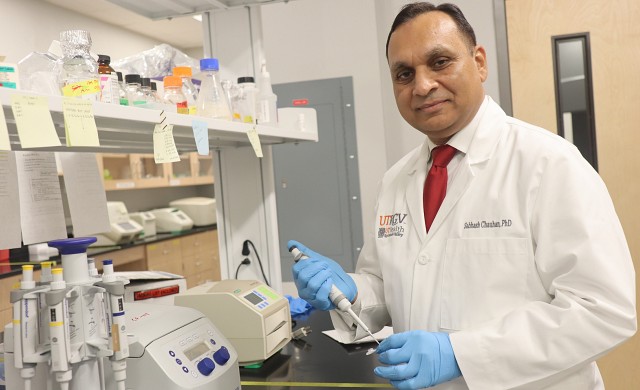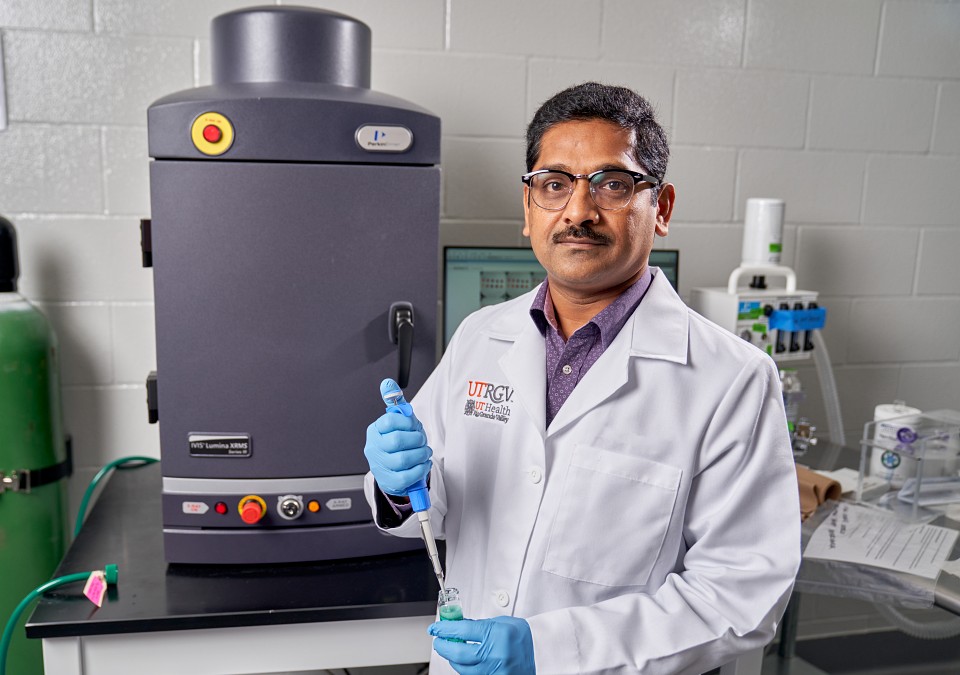Wednesday, September 25, 2024
Research, Health, Community
By Heriberto Perez–Zuñiga
RIO GRANDE VALLEY, TEXAS – SEPT. XX, 2024 – Researchers at the UTRGV School of Medicine are at the forefront of developing novel drug therapies for two of the deadliest forms of cancer: pancreatic and prostate.
While mortality rates for most cancers are improving, pancreatic cancer continues to be a major challenge. And prostate cancer remains the most common form of cancer among men in the United States, with advanced cases showing resistance to hormone therapy and other established treatments.
September is Pancreatic and Prostate Cancer Awareness Month, with the need for advancements in detection and treatment both urgent and critical.
Dr. Subhash Chauhan, director of the UTRGV School of Medicine’s South Texas Center of Excellence in Cancer Research, and Dr. Murali Yallapu, associate professor in the Department of Immunology and Microbiology at the UTRGV School of Medicine, are working on innovative solutions to combat these diseases.
Their research focuses on targeted treatments that aim to improve patient outcomes and bring hope to those affected.
LIFE-SAVING RESEARCH
New therapies have improved outcomes for many cancers, but pancreatic cancer remains one of the deadliest, with a five-year survival rate of only 5 to 10 percent.

A link exists between cancer and certain trends, like diabetes, which is endemic in the Rio Grande Valley, he said.
“These put the pancreas under stress,” Chauhan said. “As a result, our Valley residents are relatively more susceptible to cancer, and we are seeing that the overall prognosis is not very good among the Hispanic population.”
In addition – as with many other illnesses in South Texas – pancreatic cancer rates may be underreported, as individuals without health insurance or financial means do not seek services or diagnosis.
Complicating the situation further, pancreatic cancer is difficult to diagnose and treat, and many people do not get a diagnosis until the cancer is at a late stage, he said.
Chauhan’s team is exploring the use of nanoparticles to deliver drugs directly to tumors, minimizing damage to surrounding organs.
In addition to drug development, his research is focused on identifying early biomarkers for pancreatic cancer and exploring biological treatments, including probiotics and CAR T-cell therapy.
His team also is addressing socio-behavioral factors, to help educate the community about prevention and early detection.
NANOTECHNOLOGY
Dr. Murali Yallapu is leading research to combat prostate cancer, particularly drug-resistant cases.
With the support of a $1.45 million grant from the U.S. Department of Health and Human Services, Yallapu’s team is developing a nanotechnology-based drug delivery system that uses magnetic nanoparticles to deliver a potential tumor suppressor called MicroRNA-205.
Nanotechnology is the manipulation of atoms and molecules for specific goals; in this case, to optimize drug delivery to specific tumor cells that have shown resistance to other drugs.

“This study develops a safe chemotherapy regimen for drug-resistant prostate tumors in a cost-effective and efficient manner,” Yallapu said. “It will also provide useful knowledge on the long-term management of the growing population of survivors of prostate cancer.”
The research also includes training opportunities for doctoral students and enhancements to UTRGV’s research infrastructure, providing further support for the fight against cancer.
“When people think ‘cancer research,’ they think MD Anderson Cancer Center, but many don’t realize we have research of this level going on here, right in the Rio Grande Valley,” Chauhan said. “Our talented faculty is making life-changing discoveries, and it’s all happening right in our backyard. The Valley is making a real difference.”
ABOUT UTRGV
The University of Texas Rio Grande Valley (UTRGV) was created by the Texas Legislature in 2013 as the first major public university of the 21st century in Texas. This transformative initiative provided the opportunity to expand educational opportunities in the Rio Grande Valley, including a new School of Medicine, and made it possible for residents of the region to benefit from the Permanent University Fund – a public endowment contributing support to the University of Texas System and other institutions.
UTRGV has campuses and off-campus research and teaching sites throughout the Rio Grande Valley including in Boca Chica Beach, Brownsville (formerly The University of Texas at Brownsville campus), Edinburg (formerly The University of Texas-Pan American campus), Harlingen, McAllen, Port Isabel, Rio Grande City, and South Padre Island. UTRGV, a comprehensive academic institution, enrolled its first class in the fall of 2015, and the School of Medicine welcomed its first class in the summer of 2016.
